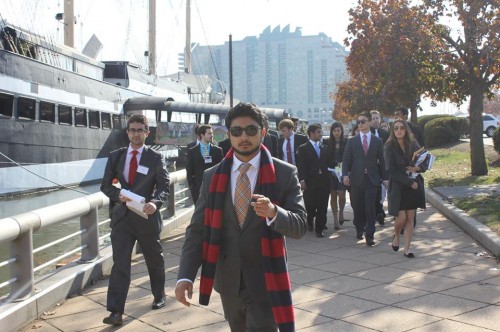
AdHoc Crisis Director Akhilesh Goswami leads the Kennedy Club to a crisis update (Photo courtesy of UPMUNC).
The University of Pennsylvania hosted the forty-seventh session of UPMUNC this past weekend in (sunny) Philadelphia and proved that although the conference has existed for nearly half a century, the Penn IAA still has some tricks up its sleeves.
In the largest North American ‘world’ collegiate circuit conference of the fall semester, delegates from across the globe had the opportunity to experience a wide variety of committee styles. General Assemblies are becoming a rarity on the ‘world’ circuit of collegiate Model UN, as more and more conferences are branding themselves as ‘crisis’ only, with some even eschewing United Nations-related committees altogether. At UPMUNC, the traditional GA committees of the First (DISec), Second (EcoFin), Third (SocHum), and Sixth (Legal) are represented, and other International Organizations are rotated in; this year the WTO was a “GA.” Georgetown, Harvard, the United States Military Academy at West Point, Yale, and the University of Chicago took home gavels in each of these committees respectively.
In the ECOSOCs, WHO, the UN Economic Commission for Africa, UNESCO, UN Commission on Narcotic Drugs, and the UNHRC, delegates delved into contentious topics such as the role of children in the elicit drug trade. UPMUNC continues to do an excellent job selecting topics that are pertinent to global discourse, and this year did not disappoint.UNHRC discussed rights of the disabled, which is very salient today with the U.S. Senate debating the disabilities treaty that the UN passed. Michigan State University, Florida International University, Ohio State University, the U.S. Naval Academy, and New York University took home first place finishes in these committees.
Since it wouldn’t be UPMUNC without a little debauchery, ECOSOCs became “Cris-o-SOCs” as a Michigan State delegate so eloquently called them, with UPMUNC staffers giving an occasional crisis update to an ECOSOC to change the tide of debate. One of these updates included a Cardinal from Costa Rica who spoke in favor of adoption rather than encouraging IVF treatment.
The crisis committees at UPMUNC were on point, especially the Papal Conclave. With a schism planned from the get-go, the committee almost immediately split into Rome and Constantinople factions, becoming a JCC without delegates truly preparing for it. Anonymous had updates that were coded so well that if you weren’t a delegate or a staffer for the committee, there was no way you’d understand what was happening. Issues regarding East Asian politics and the economy were settled for better or for worse in the Question of Hong Kong, and in the China Investment Corporation, while delegates battled for Kashmir in the Kashmiri Secession of 2020. Delegates also entered the fictional universe of two novels (and movies) in the Godfather and 1984, with many characters meeting their demise, and delegates reborn as new members of the Corleone (or 4 other) families. The JCC: Hezbollah and Israel worked to solve a centuries old conflict, the Oligarchs of Eastern Europe debated future financial holdings in the region, and the historical UNSC debated the Suez crisis. Harvard and the University of Chicago dominated the crisis committees each taking home four gavels a piece, with Michigan State University, Boston University, Georgetown University and Florida International University taking home a gavel a piece.
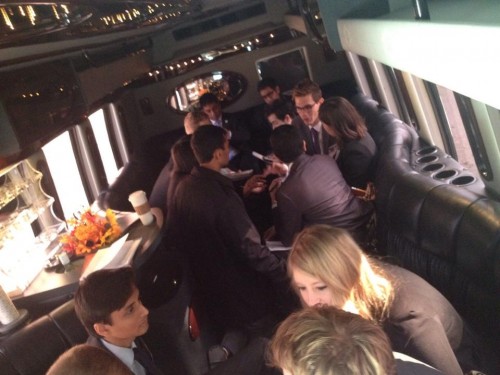
The AdHoc committee takes a limo ride to the Philadelphia Federal Reserve for a crisis update (Photo Courtesy of UPMUNC)
The AdHoc Committee of the Secretary General, which operated in a league/universe of it’s own this weekend, became known affectionately as the Kennedy Club. The brainchild of Yadavan Mahendraraj and Akhilesh Goswami, the AdHoc operated in true UPMUNC fashion by taking a limo to the Philadelphia Federal Reserve and listening to a crisis update from none other than JFK himself. Goswami and Mahendraraj headed a team of fast-responding crisis analysts, priding themselves in taking no more than 10 minutes to answer a note from delegates in committee. With a mic ready and earpiece in at all times, the two tag-teamed like nothing I’ve ever seen at a Model UN conference. In a committee stacked with amazingly talented delegates, Sam Brothers of Georgetown University, Troy Robinson of the University of Florida, and Brandon Moore of United States Military Academy at West Point took home Best Delegate honors.
Delegate fest, of course, lived up to the adage, “work hard, play harder,” as delegates were able to unwind a bit after a long weekend of debate. Complete with a senior toast (with none other than champagne bottles lit with sparklers) and a confetti drop, the Roxxy and UPMUNC put on a great party.
While a diverse group of schools took home top honors in each committee, there were a few teams that were clearly dominant last weekend. Eric Wessan, head delegate at the University of Chicago, was ecstatic about his team’s Best Large Delegation honors.
“The University of Chicago prides itself on hard work, research and substance,” said Wessan. “I am incredibly proud of my team for putting in the long hours necessary to do our best at UPMUNC. It is great that our effort was recognized and rewarded by UPMUNC Secretariat, who threw one of the best conferences of the year (as always). Shout out to my VP’s Apratim (Gautam) and Nisha (Bala) for their commendable work and to Hirsh (Shah) and UPMUNC for throwing a fantastic conference. Also to David Burke and his Vito Corleone impression.”
Cadet Brandon Moore, head delegate at the United States Military Academy at West Point, said he was proud of his team, especially the younger members.
“Though I may be especially biased after my limousine excursion with Ad Hoc, I know West Point’s delegation was very pleased with how well UPMUNC went,” said Moore. “In that light, I would again congratulate Hirsh Shah for killing it this year.”
This is Moore’s fourth year on the USMA MUN team, and with graduation looming, he mentioned the bittersweetness that came with winning at his final UPMUNC.
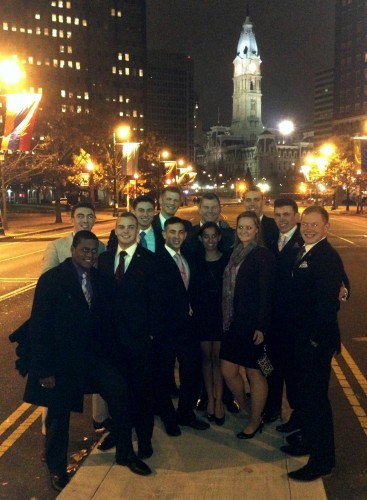
The USMA team poses at delegation dinner. West Point took home Best Small Delegation (Photo Courtesy of Brandon Moore)
“Our other 4-year members (Claire Williams, Warren Geary, and Jack Worthington) will be moving on to bigger things next year in the Army, so it’s bittersweet to conclude our final time attending these conferences. In any event, we couldn’t be happier with how this season has turned out and we’re looking forward to seeing everyone on the circuit again come January.”
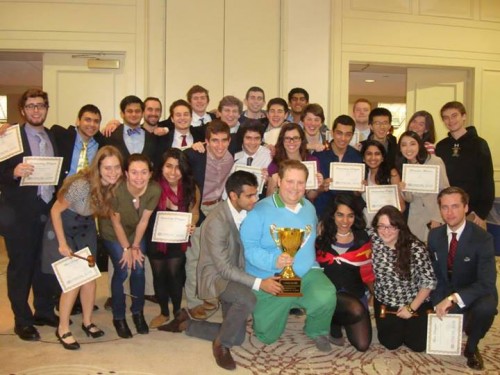
The University of Chicago team poses with their Best Large Delegation honors (Photo courtesy of Eric Wessan).
Mark Hodgson, head delegate for Florida International University’s Outstanding Small Delegation, called UPMUNC the “Super Bowl of the fall season,” and was “absolutely [thrilled] to come away with a team award.”
“Even more thrilling was the fact that 11 of our 13 delegates came away with an individual award in their committee, including several ‘newbie’ delegates who just started this semester. Special congratulations to Anthony Mercado for placing first in the 1956 Historical UNSC, and Kevin Hernandez for his first place performance in the UN Commission on Narcotic Drugs committee.”
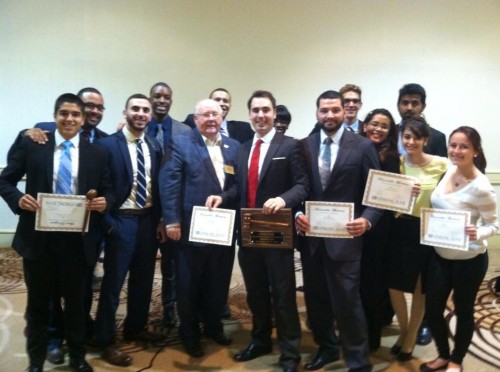
The Florida International University team poses with their Outstanding Small Delegation honors (Photo Courtesy of FIU MUN).
Sam Brothers, head delegate of the Outstanding Large Delegation Georgetown Hoyas was equally enthralled with his team’s performance, but also cited that their youthful team exceeded expectations in their great performance.
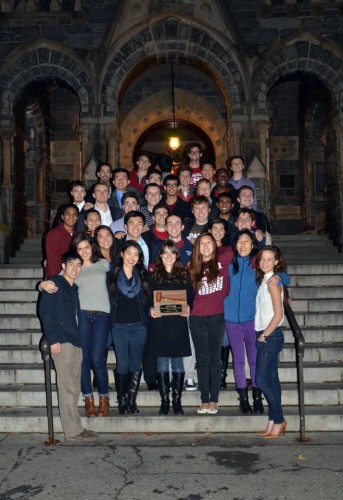
Georgetown poses with their Outstanding Large delegation honors on the steps of Healy hall on campus. (Photo courtesy of Sam Brothers).
“Having seen firsthand the work and dedication that every Georgetown delegate put in last weekend, I’m incredibly proud of our team for a strong showing at UPMUNC,” said Brothers. “I’m particularly pleased with the performance of our team’s younger members, who won several awards– given that Georgetown’s delegation at UPMUNC was nearly two thirds underclassmen, everyone, even first-time delegates, contributed tremendously to the team. I’m extremely happy with Georgetown’s performance on the circuit so far, and I can’t wait to see what the spring semester holds! Special congratulations in order to UChicago, West Point, and FIU for their delegation awards, and to Penn, for running an absolutely amazing conference!”
Delegation Awards:
Best Large Delegation: The University of Chicago; Eric Wessan is the head delegate
Best Small Delegation: The United States Military Academy at West Point; Brandon Moore is the head delegate
Outstanding Large Delegation: Georgetown University; Sam Brothers is the head delegate
Outstanding Small Delegation: Florida International University; Mark Hodgson is the head delegate



